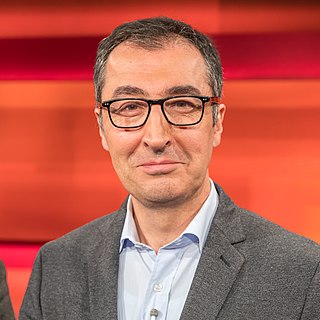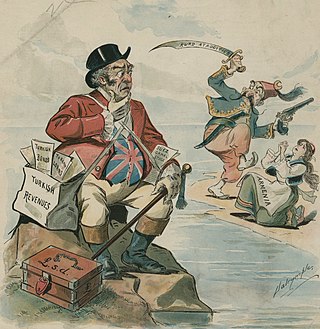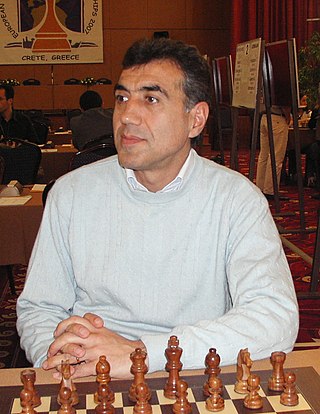
Armenian is an Indo-European language and the sole member of an independent branch of that language family. It is the native language of the Armenian people and the official language of Armenia and the unrecognized Republic of Artsakh. Historically spoken in the Armenian highlands, today Armenian is widely spoken throughout the Armenian diaspora. Armenian is written in its own writing system, the Armenian alphabet, introduced in 405 AD by the priest Mesrop Mashtots. The total number of Armenian speakers worldwide is estimated between 5 and 7 million.

The Armenian genocide was the systematic destruction of the Armenian people and identity in the Ottoman Empire during World War I. Spearheaded by the ruling Committee of Union and Progress (CUP), it was implemented primarily through the mass murder of around one million Armenians during death marches to the Syrian Desert and the forced Islamization of others, primarily women and children.

Artsakh, officially the Republic of Artsakh or the Nagorno-Karabakh Republic, is a doubly landlocked breakaway state in the South Caucasus whose territory is internationally recognised as part of Azerbaijan. Artsakh controls a part of the former Nagorno-Karabakh Autonomous Oblast, including the capital of Stepanakert. It is an enclave within Azerbaijan. Its only overland access route to Armenia is via the 5 km (3.1 mi) wide Lachin corridor which is under the control of Russian peacekeepers.

Cem Özdemir is a German politician who currently serves as Federal Minister of Food and Agriculture since 2021. He is a member of the Alliance 90/The Greens party.

The Hamidian massacres also called the Armenian massacres, were massacres of Armenians in the Ottoman Empire in the mid-1890s. Estimated casualties ranged from 100,000 to 300,000, resulting in 50,000 orphaned children. The massacres are named after Sultan Abdul Hamid II, who, in his efforts to maintain the imperial domain of the declining Ottoman Empire, reasserted pan-Islamism as a state ideology. Although the massacres were aimed mainly at the Armenians, in some cases they turned into indiscriminate anti-Christian pogroms, including the Diyarbekir massacres, where, at least according to one contemporary source, up to 25,000 Assyrians were also killed.
Graeco-Armenian is the hypothetical common ancestor of Greek and Armenian that postdates Proto-Indo-European. Its status is somewhat similar to that of the Italo-Celtic grouping: each is widely considered plausible without being accepted as established communis opinio. The hypothetical Proto-Graeco-Armenian stage would need to date to the 3rd millennium BC and would be only barely different from either late Proto-Indo-European or Graeco-Armeno-Aryan.
The 89th Taman Red Banner Orders of Kutuzov and the Red Star Rifle Division, or the Tamanyan Division, was a distinguished division in the Soviet Red Army during the Second World War. The division was primarily remembered for its second formation, composed primarily of ethnic Armenians and fought in numerous battles during the war.

Diplomatic relations between Armenia and Turkey are officially non-existent and have historically been hostile. Whilst Turkey recognised Armenia shortly after the latter proclaimed independence in September 1991, the two countries have failed to establish diplomatic relations. In 1993, Turkey reacted to the war in Nagorno-Karabakh by closing its border with Armenia out of support for Azerbaijan.

The Armenian question was the debate following the Congress of Berlin in 1878 as to how the Armenians in the Ottoman Empire should be treated. The term became commonplace among diplomatic circles and in the popular press. In specific terms, the Armenian question refers to the protection and the freedoms of Armenians from their neighboring communities. The Armenian question explains the 40 years of Armenian–Ottoman history in the context of English, German, and Russian politics between 1877 and 1914. In 1915, the leadership of the Committee of Union and Progress, which controlled the Ottoman government, decided to end the Armenian question permanently by killing and expelling most Armenians from the empire, in the Armenian genocide.

Smbat Gariginovich Lputian is an Armenian chess Grandmaster. He was first at tournament in Berlin 1982, shared first at Athens 1983 and at Irkutsk 1983, first at Sarajevo 1985 and at Irkutsk 1986, shared first at Hastings 1986–87 and first at Dortmund 1988. He won the Armenian Championship in 1978, 1980, 1998, and 2001. In 2006, he won a team gold medal at the 37th Chess Olympiad. Smbat Lputyan has been the founder-president of Chess Academy of Armenia since 2002.

Armenia, officially the Republic of Armenia, is a landlocked country in the Armenian Highlands of West Asia, with geopolitical ties to Europe. It is a part of the Caucasus region and is bordered by Turkey to the west, Georgia to the north, the Lachin corridor and Azerbaijan to the east, and Iran and the Azerbaijani exclave of Nakhchivan to the south. Yerevan is the capital, largest city and financial center.

Armenians in Germany are ethnic Armenians living within the modern republic of Germany. Like much of the Armenian diaspora, most Armenians immigrated to Germany after the Armenian genocide of 1915. Others came later, fleeing conflicts in places like Iran, Azerbaijan and Lebanon. Another influx came fleeing nationalist persecution in Turkey. After World War II, many Soviet Armenians, former POWs in particular, fled to the American occupied areas of Germany. While many traveled on, some settled in the country, providing a base for later asylum-seekers.

Armenian nationalism in the modern period has its roots in the romantic nationalism of Mikayel Chamchian (1738–1823) and generally defined as the creation of a free, independent and united Armenia formulated as the Armenian Cause. Armenian national awakening developed in the 1880s in the context of the general rise of nationalism under the Ottoman Empire. The Russian Armenia followed with significant causes. The Armenian Apostolic Church has been a great defender of Armenian nationalism, with leaders like Khrimian Hayrik who devoted his life to the peasantry. The establishment of modern Armenia (1991) and Armenian social fabric becoming more complex gradually decrease the political influence of Hye Dat and shifted towards a modern Armenian nationalism modeled as a liberal nationalism.

Relations between Armenia and Germany, have always been stable and solid, with both countries continuing to work together and advance through the years in cooperation. Both countries' leaders have discussed bilateral relations and noted that they have considerably improved over the last few years.
Armenian studies or Armenology is a field of humanities covering Armenian history, language and culture. The emergence of modern Armenian studies is associated with the foundation of the Catholic Mechitarist order in the early 18th century. Until the early 20th century, Armenian studies were largely conducted by individual scholars in the Armenian communities of the Russian Empire, Europe, Constantinople and Vagharshapat in Armenia. After the establishment of Soviet rule, Armenian studies, and sciences in general, were institutionalized in Armenia and put under direct control of the Academy of Sciences. Today, numerous research centers in many parts of the world specialize in Armenian studies.

Armenia Time is a time zone used in Armenia. Armenia Time is four hours ahead of UTC at UTC+04:00.

Meri "Masha" Mnjoyan, is an Armenian singer, the winner of The Voice of Armenia television singing competition in 2013.

The Armenia–Turkey border is 311 km in length and runs from the tripoint with Georgia in the north to the tripoint with Azerbaijan in the south. The land border has been closed since 3 April 1993. The border is set to reopen for diplomats and citizens of third countries in 2023.














